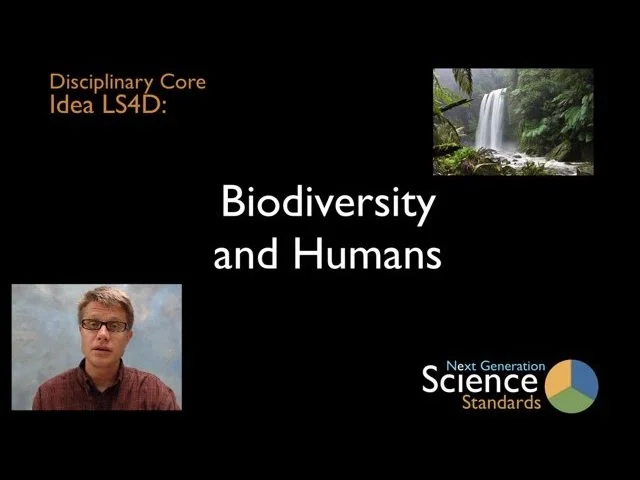LS4.D: Biodiversity and Humans
What is biodiversity, how do humans affect it, and how does it affect humans?
K-12 Progressions
| K-2 | 3-5 | 6-8 | 9-12 |
|---|---|---|---|
| A range of different organisms lives in different places. | Particular organisms can only survive in particular environments. Populations of organisms live in a variety of habitats. Change in those habitats affects the organisms living there. . | Changes in biodiversity can influence humans’ resources and ecosystem services they rely on. | Biodiversity is increased by formation of new species and reduced by extinction. Humans depend on biodiversity but also have adverse impacts on it. Sustaining biodiversity is essential to supporting life on Earth. |
Grade Band Endpoints for LS4.D
By the end of grade 2. There are many different kinds of living things in any area, and they exist in different places on land and in water.
By the end of grade 5. Scientists have identified and classified many plants and animals. Populations of organisms live in a variety of habitats, and change in those habitats affects the organisms living there. Humans, like all other organisms, obtain living and nonliving resources from their environments.
By the end of grade 8. Biodiversity is the wide range of existing life forms that have adapted to the variety of conditions on Earth, from terrestrial to marine ecosystems. Biodiversity includes genetic variation within a species, in addition to species variation in different habitats and ecosystem types (e.g., forests, grasslands, wetlands). Changes in biodiversity can influence humans’ resources, such as food, energy, and medicines, as well as ecosystem services that humans rely on—for example, water purification and recycling.
By the end of grade 12. Biodiversity is increased by the formation of new species (speciation) and decreased by the loss of species (extinction). Biological extinction, being irreversible, is a critical factor in reducing the planet’s natural capital.
Humans depend on the living world for the resources and other benefits provided by biodiversity. But human activity is also having adverse impacts on biodiversity through overpopulation, overexploitation, habitat destruction, pollution, introduction of invasive species, and climate change. These problems have the potential to cause a major wave of biological extinctions—as many species or populations of a given species, unable to survive in changed environments, die out—and the effects may be harmful to humans and other living things. Thus sustaining biodiversity so that ecosystem functioning and productivity are maintained is essential to supporting and enhancing life on Earth. Sustaining biodiversity also aids humanity by preserving landscapes of recreational or inspirational value.
Introduction to LS4.D
from A Framework for K-12 Science Education: Practices, Crosscutting Concepts, and Core Ideas (page 166)
Human beings are part of and depend on the natural world. Biodiversity—the multiplicity of genes, species, and ecosystems—provides humans with renewable resources, such as food, medicines, and clean water. Humans also benefit from “ecosystem services,” such as climate stabilization, decomposition of wastes, and pollination that are provided by healthy (i.e., diverse and resilient) ecosystems. The resources of biological communities can be used within sustainable limits, but in many cases humans affect these ecosystems in ways—including habitat destruction, pollution of air and water, overexploitation of resources, introduction of invasive species, and climate change—that prevent the sustainable use of resources and lead to ecosystem degradation, species extinction, and the loss of valuable ecosystem services.
Performance Expectations Associated with LS4.D
videos
Next Generation Science Standards is a registered trademark of Achieve. Neither Achieve nor the lead states and partners that developed the Next Generation Science Standards were involved in the production of this product, and do not endorse it. Visit the official NGSS website.


